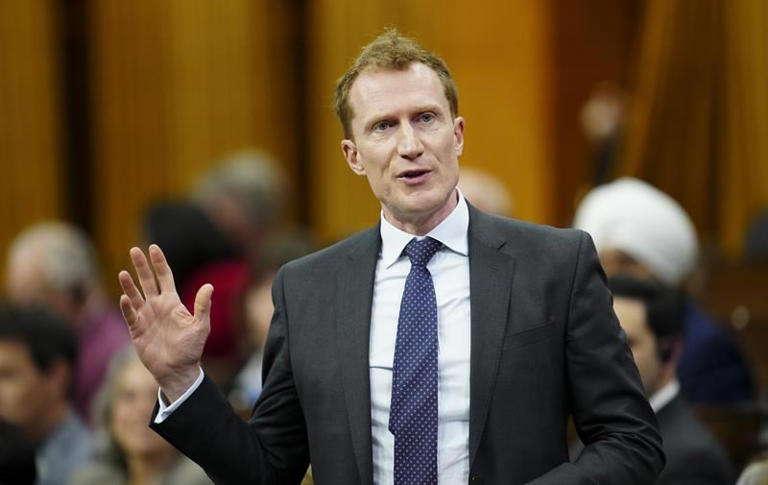How a last-minute Liberal scramble neutralized the NDP's attempt to recognize a Palestinian state

Foreign Affairs Mélanie Joly, with government House leader Steven MacKinnon behind her, speaks to reporters in the Foyer of the House of Commons in Ottawa on Monday, March 18, 2024.© Spencer Colby/The Canadian Press
OTTAWA – Minutes before MPs were set to vote on a controversial NDP motion to unilaterally recognize a Palestinian state, a senior Liberal staffer bolted out of the NDP’s lobby in the House of Commons with a stack of papers in hand.
He dashed around the U-shaped precinct that surrounds the House chamber, briefly ducked into the Liberal lobby, then continued the mad scramble to get the papers to government House leader Steven MacKinnon.
MacKinnon was set to speak in the House in just a few minutes. When he was done, MPs would vote on the highly controversial NDP motion that recognized Palestinian statehood and, among other things, called for an arms embargo against Israel and a ceasefire between Israel and Hamas — without calling on the latter to lay down arms.
The details of the drama that unfolded Monday night over that motion — the frenzied last-minute negotiations, the surprise rewrite, the significant climbdown by the NDP from its most controversial demands — came to light Tuesday after MPs had time to digest the startling episode. National Post interviewed several people close to the events to piece together what happened that led to the divisive motion being watered down until it became palatable enough to easily pass the House.
Motions are not binding on the government. Still, most Liberals, including the entire cabinet, had said they would not support the original NDP motion unilaterally recognizing a Palestinian state without multiple amendments.
On Monday night, those amendments — finally agreed upon in extremis between the Liberals and NDP after days of tense negotiations — were now in the hands of the senior Liberal staffer, who needed to get them to MacKinnon, the Liberal House leader, before his time was up and the vote was called.
The vote was expected to happen around 7:30 p.m.
Around 7:09 p.m., MacKinnon was shuffling with a new stack of papers that had arrived on his desk in the House. He stood up and, reading from papers scribbled with pen marks and edits, announced he was tabling last-second amendments.
Only a handful of people were aware of the amendments before MacKinnon dropped them in the House of Commons. One Liberal confirmed most government MPs were unaware of what was being proposed until MacKinnon read them into the record.
Then Liberals held their breath until the sponsor of the motion, the NDP’s foreign affairs critic, Heather McPherson, stood up and said she consented to the amendments. “It wasn’t done until it was done,” a senior Liberal staffer confided after the fact.
The NDP motion, on the docket since February, was supposed to be debated on March 1, but then former prime minister Brian Mulroney died on Feb. 29, the House rose out of respect, and the debate was delayed as MPs went off to two consecutive break weeks in their ridings.
Yet, Liberals and New Democrats only started to negotiate amendments to the motion in the last few days, with MacKinnon and his NDP counterpart, Peter Julian, working to hammer out prospective details over this past weekend and the Liberal cabinet holding an emergency meeting on Saturday.
It was far from a smooth process. Although the NDP has for years been supporting the minority Liberal government with a supply-and-confidence agreement, the talks between both parties had appeared to have stalled by midday Monday. An NDP source said at the time that the Liberals wanted to keep the policy “status quo and turn this into a self-congratulatory motion.”
“Ultimately, we walked away,” said McPherson in an interview Tuesday. “I was quite confident that there was not going to be a deal. I had people in tears on the phone telling me how heartbroken they were that we couldn’t get something passed.”
Midday on Monday, Joly stood in the House to declare that there were “issues” with the text of the original motion and hinted that cabinet would not agree to it. Canada’s policy has long been that recognizing a Palestinian state would come as part of a larger peace deal between Israelis and the Palestinian leadership. The government, she said “can’t change foreign policy based on an opposition motion.”
“Over the last few days, we were pretty far apart to be honest. They tried to soften a whole bunch of stuff that we couldn’t live with,” said McPherson, adding that points of contention remained around Palestinian statehood and arms exports to Israel.
A Liberal source speaking on background mentioned the original motion was not balanced, nor did it reflect the government’s view. Despite that, several Liberal MPs came out publicly to say they would still support the NDP’s original motion.
Ultimately, talks resumed late Monday afternoon in hopes of finding a compromise. Foreign Affairs Minister Melanie Joly took the unusual step of intervening in the process at the 11th hour to make sure some version of the motion would pass, wanting to show she could find a path forward to ensure Liberals could support it.
McPherson said Joly “came in and hunted me down in the opposition lobby.”
As the motion came down to the wire, a Liberal source said Joly was running back and forth between the Prime Minister’s Office, the government House leader’s office and the NDP lobby to smooth out the final sticking points to reach an agreement that would satisfy all parties.
“There were two weeks between when we tabled this and when it came to the House. And the Liberals left it till the last minute and thought that they would be able to get something done. Frankly, it was frustrating to work with them,” said McPherson in an interview.
In the end, the amended motion included modified language to “cease the further authorization and transfer of arms exports to Israel to ensure compliance with Canada’s arms export regime” and a clear demand for Hamas to “lay down its arms.”
Instead of recognizing a Palestinian state, it called on the government to “work with international partners to actively pursue the goal of a comprehensive, just and lasting peace in the Middle East, including towards the establishment of the State of Palestine as part of a negotiated two-state solution.”
Late Monday after the vote, Joly said the government wanted a motion it could stand behind and this motion reflects the government’s position.
“This is clearly the intent of this government to make sure that we follow what is written in this motion and that is why we’ve worked very hard to make sure that we could get to a text where we could abide by it,” she said.
McPherson said she is not completely satisfied with the end result, but pointed out what she considers some wins.
“We’re a G7 country that has agreed that we are going to stop sending arms to Israel. That is huge. That is a massive thing,” she said. “The fact that we now have language on an end to the decades-long illegal occupation, this is big, big stuff.”
Conservatives and a handful of Liberal MPs had opposed the last-minute changes, arguing that they had been debating all day a motion that no longer existed.
“This amendment has been dropped with … substantive changes to the original motion, which no member in this place has had a chance to look at or debate,” said Conservative MP Michelle Rempel Garner to Deputy House Speaker Chris d’Entremont.
Liberal MP Marco Mendicino echoed his colleague’s sentiment from across the aisle. “I think what you are hearing is a concern that the very elaborate amendments that have just been introduced by the government House leader have not been debated,” he said.
The amendments had been so rushed, there was no French translation available, which annoyed the Bloc Québécois.
D’Entremont said he wished it were within his power to delay the vote until Tuesday but could not because MPs had previously agreed to hold the vote the same day as the debate.
Conservative House leader Andrew Scheer attempted to obtain unanimous consent to defer the vote but failed. The vote on the heavily amended motion finally happened late Monday night — two hours after it had been originally expected.
Julian asked for a recorded vote for this “historic” moment, which saw the NDP, the Bloc, the Greens and most Liberals vote in favour of the motion. All the Conservatives and Liberal MPs Mendicino, Anthony Housefather and Ben Carr voted against the motion.
“Canada must play a constructive role in the Middle East, but our foreign policy should not be negotiated on the back of an opposition motion,” said Mendicino in a statement.
After the vote, Joly congratulated herself and her NDP counterparts for being able to “work all together and to find common ground.” McPherson said the debate on the motion was a “historic” moment, but she said she expects more to be done.
“We will use whatever tools we have within our toolbox to move this conversation forward,” she said.
National Post
Motion on Israel-Hamas war will have consequences for asylum seekers in Gaza: Miller

OTTAWA — Immigration Minister Marc Miller says the amended motion on the Israel-Hamas war the House of Commons passed Monday could make it harder for people seeking asylum in Canada to get out of Gaza.
He says it could make the situation worse for a Canadian program that has already been, in his words, a "failure."
Miller says he thinks the motion was fair and principled after it was altered to reflect 14 amendments proposed by the Liberals.
The final motion eliminated a standalone call to recognize Palestinian statehood and instead saw MPs support progress toward a peace process and a two-state solution as per existing Canadian policy.
But Miller says the motion has upset Israel's government and will have consequences.
Israel's foreign minister said Tuesday that measures outlined in the motion, including the suspension of arms exports to Israel, would undermine his country's ability to defend itself — and that history would judge Canada harshly.
Miller told reporters Wednesday morning that the government always knew the program to offer asylum to extended family members of Canadians who are in the Gaza Strip could fail.
Only 14 people have been able to get out. The motion could have consequences for others who are waiting, he said.
"The adoption of that motion doesn't help getting people out."
He said the Israeli government has made it clear that it is watching what Canada does.
"And any actions that are seen as to be unfavourable can affect their decision-making at the highest political level," Miller said.
"And so we can't be naive as a country as to the actions that we take and the impact that can have on the ground and for actual people's lives."
Miller said he was not saying that the motion was "a bad thing to adopt," adding it represented a "principled position" as amended.
"But the actions of the government of Canada (have) consequences. And on the particular impact of that program, I don't think that motion is necessarily a good thing."
This report by The Canadian Press was first published March 20, 2024.
No comments:
Post a Comment